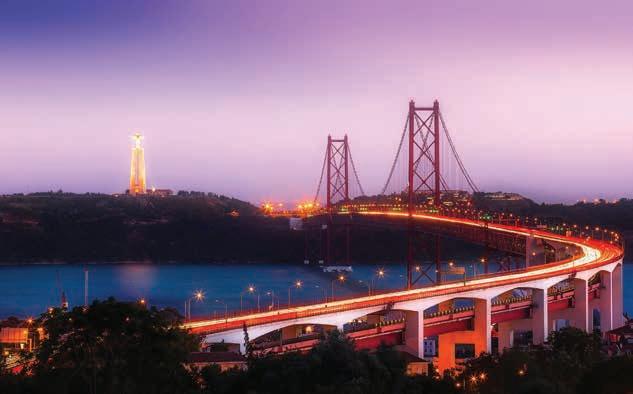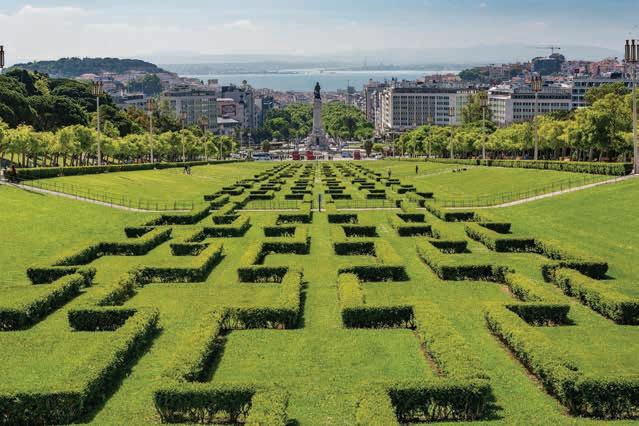
3 minute read
Lisbon: Green Capital
start on 2020 with European Go-ahead Lisbon gets a head Green Capital classification
JASON AGNEW reports on the Portuguese city that has taken its place in an elevated environmental milieu
Advertisement
LISBON has become the first national capital in the south of Europe to be awarded the European Green Capital title.
Although the prize was lifted by the Basque city Vitoria-Gasteiz in 2012 (geographically in the south of the continent, even if the populace don’t feel that they are), the only previous national first cities to achieve the accolade have been the Scandinavian triumvirate of Stockholm, Copenhagen and Oslo, along with Ljubljana in Slovenia.
What makes Lisbon’s journey to sustainability exceptional is that it started during a
Inspiration,
and a model
for many cities
around EU
period of economic crisis. The transformation provides inspiration and a model for many cities across the EU, demonstrating that sustainability and economic growth go handin-hand. Economic difficulties no longer cut it as an excuse for environmental inaction.
So, how did this port city in the Tagus estuary, founded by the Phoenicians three millennia ago, manage to pull off such a remarkable conversion?
When the Socialist leader Antonio Costa won the elections in November 2015, he hit the ground running in tying economic growth to green policies, determined to prove that there is no mutual exclusivity. The progressive government has led the way in the decriminalisation of drug consumption — with unprecedented success in

Britain’s Edward VII visited Lisbon in 1903 and gave his name to the largest park in the city
reducing the rate of addiction. Costa’s administration, in the words of the jury, “showed how to turn environmental challenges into opportunities, and make their cities healthy and enjoyable places to stay, live and work in, using best-practice environmental management, good urban planning, and citizens at the heart of their green transformation”.
Lisbon was the first capital in Europe to sign the New Covenant of Mayors for Climate Change and Energy in 2016. To be fair to previous administrations, this was done after achieving a 50 percent reduction in C02 emissions (2002-14); reducing energy consumption by 23 percent, and water consumption by 17 percent, from 2007 to 2013. Costa was continuing a transformation he had already contributed to while mayor of Lisbon from 2007 to 2015.
In the last few decades of the 20th century, Lisbon, like many cities, experienced population decline as people moved out to the suburbs. This caused an increase in traffic as people commuted by road to the centre. To counter this, a Sustainable Energy Action Plan was drawn up in 2002. This concentrated on the transport sector, which managed to reduce its consumption by over a third by 2012.
URBAN MOBILITY Lisbon has a clear vision for sustainable urban mobility and has introduced measures restricting car use and prioritising cycling, public transport and walking. In common with other urban centres, Lisbon has introduced a public bike-sharing scheme — and two-thirds of Lisbon's fleet is made up of electric cycles because of its hilly topography.
The Portuguese capital also boasts one of the world's most extensive vehicle-charging networks, with 516 plug-in points around the city. Two in five vehicles in the municipal car fleet are now electric; the local council is leading by example.
The council has also increased bus and tram routes: 93 percent of the population live within 300 metres of a public transport service.
It has also converted derelict land into sustainable green spaces and has developed an infrastructure to counter the effects of climate change and encourage people back into the CBD.
Repopulation has been a mixed blessing, as property prices in traditional areas such as Alfama have seen prices rocket, forcing local families out as gentrification takes hold.
The current mayor, Fernando Medina, banned all plastic cups, dishes and cutlery from its schools in 2018 and offered freshly cooked meals to all pupils. As of 2020, the ban has been extended to the city's bars and restaurants. Shops are no longer allowed to sell fruit, vegetable or bread in plastic packaging.
These measures demonstrate that where there is a political will, administrations can make a marked difference in improving the environment while fostering economic growth.










